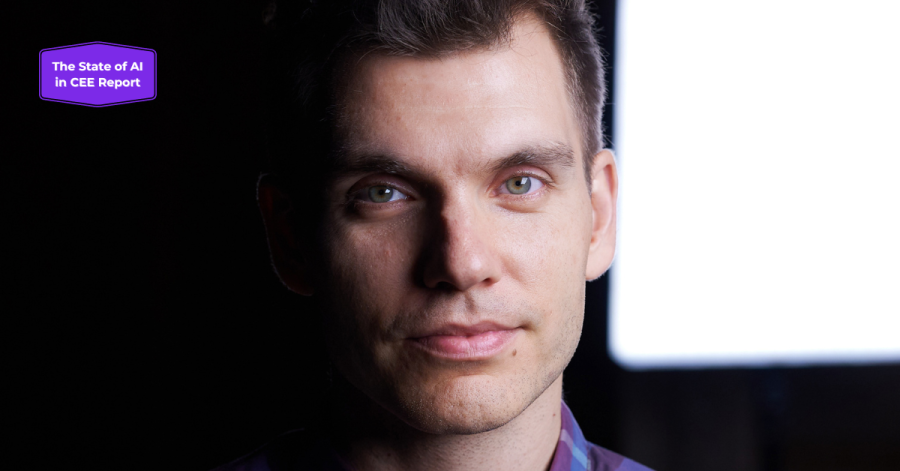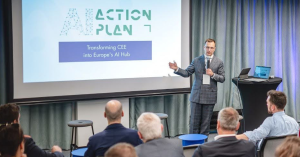“Bulgaria boasts talented individuals with strong technical skills, particularly in math and physics, who possess a keen ability to self-learn and adapt to AI technologies.”
Vince Gaydarzhiev is the founder of the US-Bulgarian company Alcatraz AI. The hardware-as-a-service startup offers autonomous access control that uses facial biometrics, 3D sensing, and AI. The company closed a $25M Series A round in 2022.
Among the customers of Alcatraz AI are Fortune 500 companies, including telecoms and government-owned banks. Before becoming an entrepreneur, Vince worked as an engineer for companies like Apple and Nvidia. He holds several engineering degrees from Stanford and the Universities of Southern California and Florida.
In a conversation with The Recursivee Vince Gaydarzhiev attributes the acceleration in the AI innovation ecosystem in Central and Eastern Europe (CEE) to the abundance of highly skilled talent in math, physics, computer vision, and computer science. He also discusses Alcatraz AI’s market expansion, what challenges can AI solve for the security industry, and how Alcatraz AI is proactively considering privacy and security aspects and exploring innovative methods to comply with upcoming EU AI regulations.
The following interview was conducted as a part of The Recursive’s “State of AI in CEE” report. Download the full report with insights from 40+ experts and an analysis of 900 AI product companies from CEE here.
The Recursive: What were some of the biggest milestones and challenges for Alcatraz AI in the past year?
Vince Gaydarzhiev: Primarily, we faced numerous obstacles related to selling our products to large enterprises and government entities, particularly in the US and Europe. The main challenge stemmed from the differences between GDPR-related privacy and security regulations in these regions. In the US, the absence of a federal-level law similar to GDPR meant that each state had its own subjective approach to privacy and security.
To overcome these hurdles, we undertook extensive development efforts on the software, documentation, and certification fronts. Our aim was not only to comply with GDPR, which we had adhered to since the beginning but also to proactively meet any future federal-level privacy and security laws concerning access control and biometrics. This was crucial since our focus was on deploying biometric solutions to authenticate employees with their consent.
Over the last 12 to 18 months, Alcatraz AI dedicated significant resources to achieving these goals, and the results have been favorable. Presently, we have a comprehensive software, documentation, and legal package ready for our large customers, streamlining the onboarding process significantly.
One of Alcatraz AI’s proudest achievements is the development of a pioneering biometric product, which features facial recognition technology. This innovative product is set to be unveiled early next year, and it will be unlike anything seen before in the biometrics industry.
Additionally, we expanded our market reach by initiating sales efforts in Europe and the broader EMEA region over the past four months. We recruited new salespeople based in Europe and Dubai to support our endeavors.
Almost everything from a software perspective has been developed in Bulgaria. We have a talented 30-person team based in Sofia, working on computer vision, machine learning, full stack, and mostly embedded software.
What are the current challenges or pain points in the access control and security industry that AI can address or solve?
We’ve been actively working with AI since 2016, even before it became widely known. Back then, we already envisioned the potential of AI for everyone, though not everyone else fully grasped its capabilities.
AI can address and solve many of the current challenges and pain points in the access control and security industry. For instance, in the context of corporations, security guards often perform face control, comparing employee badges with their faces to ensure the right person is granted access. They also handle manual two-factor authentication and may need to ask everyone to badge in to prevent tailgating. With AI, we’ve extensively trained and fine-tuned our algorithms to handle all these cases. Alcatraz AI can successfully perform face recognition and two-factor authentication continuously, 24/7, and even more accurately than a security guard. This significantly reduces the risk of unauthorized access.
Furthermore, AI enables powerful backend analytics, providing valuable data to security teams. For example, it can track the number of people entering and exiting areas, helping with building occupancy management. The data can be utilized to identify areas with lower security, where tailgating might be occurring, or even pinpoint specific individuals who may be enabling tailgating.
How do you think the upcoming EU AI regulatory framework will impact the adoption of AI products and services?
AI regulation is undoubtedly necessary, and at Alcatraz AI, we have already taken steps to regulate ourselves, and the large corporations we work with have also implemented preemptive rules to ensure strict compliance with biometrics, privacy, and security standards.
In fact, Alcatraz AI is well-positioned to comply with the upcoming EU AI regulatory framework and also to lead in creating robust regulations within the industry. We are proactively considering privacy and security aspects, and we are exploring ways to regulate the use of biometric data more effectively. Our approach includes considering solutions that may not even involve using pictures, videos, or specific employee data during access control processes. Instead, we are exploring innovative methods, such as relying solely on badge numbers to authenticate employees.
How would you evaluate the potential for growth and development in the AI innovation ecosystem in CEE and why?
The main reason for the acceleration in the AI innovation ecosystem in CEE is the abundance of talent in the region. We have a pool of highly skilled professionals with expertise in math, physics, computer vision, and computer science. Some engineers have years of experience, while others are fresh out of college. In the past few years, educational institutions have also started offering majors specifically focused on AI, computer vision, machine learning, and neural networks. This has contributed to fostering a strong talent base.
Which are the top AI specializations and skills in Bulgaria according to you?
The top AI specializations and skills in Bulgaria are rooted in strong math and physics backgrounds. Individuals in the region possess a good foundation in these areas and have been catching up with AI technology through self-learning, even if it wasn’t covered extensively in their formal education.
Another strength of the talent in Bulgaria is their capacity to work effectively in teams to solve complex problems over the long term. Unlike the trend in some other regions, where engineers may frequently switch companies, we observe a higher degree of loyalty in the Bulgarian talent. Many engineers stay with one company for 2 to 5 years, or even longer. This commitment allows them to deeply focus on addressing significant issues, especially with an AI focus. It also facilitates active involvement in product implementation and deployment, gathering customer feedback, and iterating on the product to continually improve it.








